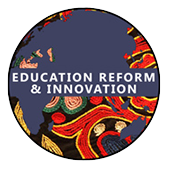As illustrated by our work in Kazakhstan, three types of impact can be traced:
1. Impact on policy
- As part of the Roadmap project ERI team members worked alongside the Minister of Education and his Ministry to establish strategic goals and implementation plans on trilingual education, teacher preparation and continuing professional development. There is an on-going programme of research to document the process of reform and provide an important evidence base to the Ministry and other actors for decision-making, governance and allocation of resources purposes.
2. Impact on classroom practice and student learning
- The Faculty partnered with NIS CoE and CIE to deliver a large scale in-service professional development programme which successfully reached around 700 trainers and 50,000 teachers over four years. The ‘ambitious and empirically-based’ (OECD 2014: 177) model of professional development has been adopted as a model for the whole country and is influencing the reform of initial teacher education too. The programme has been researched for impact (Wilson et al, 2017). Outcome measures have been used to monitor the changes in organisations and practice linked to the intervention. The impact analysis is based on an in-country study of a random stratified sample of 231 schools from the 7307 total comprehensive schools from all the regions of Kazakhstan. Additionally, a 2016 study of the NIS pilot schools shows that the new curriculum is having an impact on pedagogy and teacher motivation.
- A Faculty of Education based teacher professional development programme (supported by the Bolashak JSC “Center for International Programs”) focuses upon Pedagogy, Curriculum, Education Innovation and Leadership. This course aims to enhance the development in Kazakhstan by developing in-depth training of future pedagogic leaders. It explores understandings of schools-university and school-based models of teacher education, as well as examining the pedagogies of teacher education, the skills of developing established teachers. It engages with issues of leadership and professional development in the broadest sense and at every level – from international policy to local educational settings. Researching practice and internships in local schools are important parts of this programme.
- The teacher development impacts on students learning and a current study of student engagement will detail this. The pilot study shows sings of increased teacher and student motivation.
- The aim has been to build a sustainable and lasting approach to teaching and learning reliant on local systems and this has been established. (Wilson et al, 2017).
3. Impact on the research community
- Partnership with Nazarbayev University, Graduate Schools of Education. The Faculty, together with its partner UPenn, has led research with NU colleagues to support the educational reform process. The joint research, advisory services and support for Nazarbayev University Graduate School of Education helped to establish the first accredited world class MA and PhD research degree programmes in the region.
- Establishing KERA (Kazakhstan Educational Research Association). Professor David Bridges, former Director of the Kazakhstan Programme, was key in establishing KERA and linking it to BERA.
- Helping to establish a Research Advisory Board and Research department in NIS to develop research informed practice and policy.
- Faculty colleagues helped establish the research informed approach and continue to support via board membership. The partnerships have had a lasting influence on the values, ethos, practices and approaches to educational change in the country.
- The Eurasian Research Forum, a student led research forum has run for 4 years at the Faculty of Education in partnership with the UK Embassy of the Republic of Kazakhstan. Kazakhstani students in UK universities present their Master and PhD level work.
- The Kazakhstan open seminar series provided a platform for analysis, discussion and critique of the recent educational reforms in the Newly Independent nations of the former Soviet Union and its satellite states. The collection includes 51 recordings, which have been viewed over 5750 times by viewers in more than 54 countries. See the statistics here.
References
OECD (2014) Reviews of National Policies for Education: Secondary Education in Kazakhstan, OECD Publishing.
Wilson, E. (2017) Bringing about change in schools; the case of Nazarbayev Intellectual Schools, Centre of Excellence Teacher and Leadership Programmes. Faculty of Education, University of Cambridge and Centre of Excellence.


